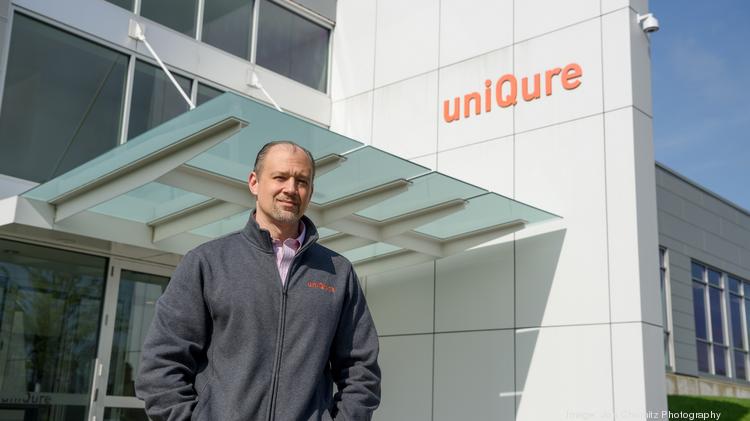When the U.S. Food and Drug Administration approved the first gene therapy for hemophilia B on Tuesday, it was a win not only for CSL Behring, which owns the rights to the drug, but for Lexington’s UniQure NV.
UniQure (Nasdaq: QURE) originally developed the drug, now called Hemgenix, and licensed it to CSL back in 2021. At that time, the Australian company, whose U.S. headquarters are in King of Prussia, Pennsylvania, paid $450 million to UniQure for its global rights. UniQure CEO Matt Kapusta said his company is eligible to receive another $1.6 billion in commercial milestone payments, plus tiered, double-digit royalties from net sales, which will be paid out in the coming years as the drug makes its way to patients.
Hemgenix is a onetime gene therapy for hemophilia B, a blood disorder that the U.S. Centers for Disease Control and Prevention estimate affects around 30,000 Americans, making it one of the more common rare diseases. Hemophilia is caused by a deficiency in the blood clotting Factor IX, a protein needed to produce blood clots to stop bleeding.
Specifically, Hemgenix is approved for hemophilia B patients who currently use Factor IX prophylaxis therapy, or who have had life-threatening hemorrhaging or repeated and serious spontaneous bleeding episodes at any point.
“This is where gene therapy is beginning to migrate from ultra-rare orphan diseases that might impact hundreds of patients or thousands of patients,” Kapusta said. “What hemophilia B represents is the inevitable transformation of the power of gene therapy to (treat) more prevalent rare diseases. I really do think this is kind of a new phase that’s being ushered in that we’re really proud to be a part of.”
A comeback story
The drug is the second of the company’s adeno-associated virus (AAV) gene therapies to be approved by a regulatory agency. The first was a drug called Glybera, a treatment for familial lipoprotein lipase deficiency (LPLD), an ultra-rare genetic disorder involving a defective gene for lipoprotein lipase that leads to very high triglycerides.
The European Commission granted a five-year marketing authorization for Glybera back in 2012 for a small subset of LPLD patients, but it came with a slew of requirements: a post-approval clinical trial, annual regulatory assessments and risk management procedures. The burden of those requirements, paired with extremely minimal uptake of the drug — reportedly, only one patient had received the drug by 2017 — led UniQure to abandon Glybera, electing not to renew its marketing authorization. It expired in October 2017.
Meanwhile, the company was toiling away on a new gene therapy for hemophilia. According to Kapusta, UniQure had originally gotten into hemophilia B gene therapy in 2008, when the company in-licensed a gene cassette from St. Jude’s Children’s Hospital and tweaked it to fit hemophilia B patients. The goal was to get those patients slightly closer to the normal range for Factor IX, the clotting protein.
The drug showed promise in a clinical trial in 2015, but there was little fanfare. Gene therapy was becoming more mainstream. Incremental improvements, consequently, had become less tolerable for regulators and investors.
“Our approach was basically written off as inferior, and our program was deemed a loser. This was the doldrums for the company,” Kapusta said. “We were trading below cash. We were trading at less than $5 a share. Nobody really seemed to care about the program. We then made a decision that we were going to go to a next-generation hyperactive transgene.”
UniQure, Kapusta said, upped its game. The team set its sights on getting to 30% to 40% of the normal clotting range, which is “functionally curative.” Regulators were impressed, and they allowed UniQure to take the drug directly into a clinical study.
That was in 2017. By the time UniQure licensed what would become Hemgenix to CSL Behring three years later, it was already in Phase 3 clinical trials. UniQure was also already in the process of scaling up its manufacturing, which it had already put in place several years prior for Glybera.
What’s ahead
Now that Hemgenix is approved, UniQure is responsible for the global manufacturing of the product at its licensed facility in Lexington. UniQure is headquartered in the Netherlands, but its U.S. operations are in Lexington, where more than 225 employees — half of its full-time headcount, and most of the executive team — are based.
Glybera may have been a commercial failure, but Kapusta credits it with laying the foundation for Hemgenix’ success. CSL Behring has said it plans to make the drug “available for eligible people with hemophilia B as soon as possible.”
“I do believe it’s considered best in class, and it’s ahead of all that competition,” Kapusta said. “This means an incredible amount to us as a company. We would not have been able to do that but for the experience we have with Glybera and the experience we have with manufacturing.”


